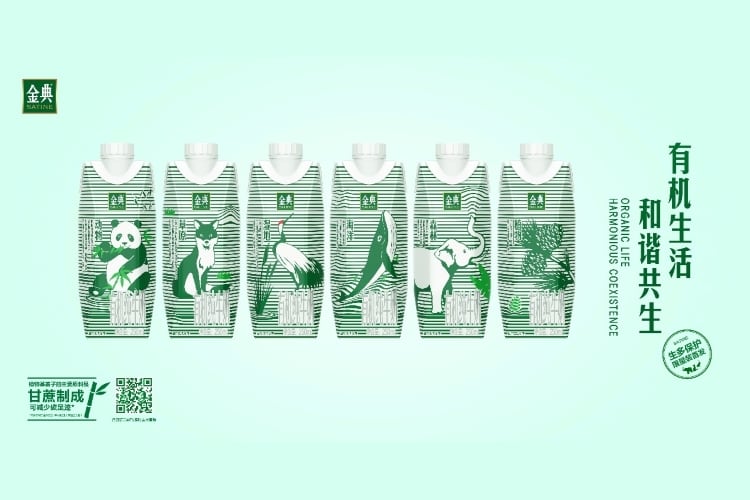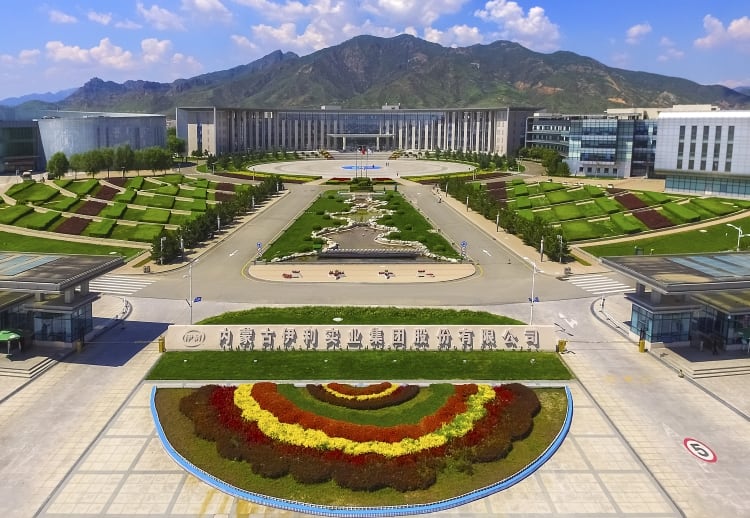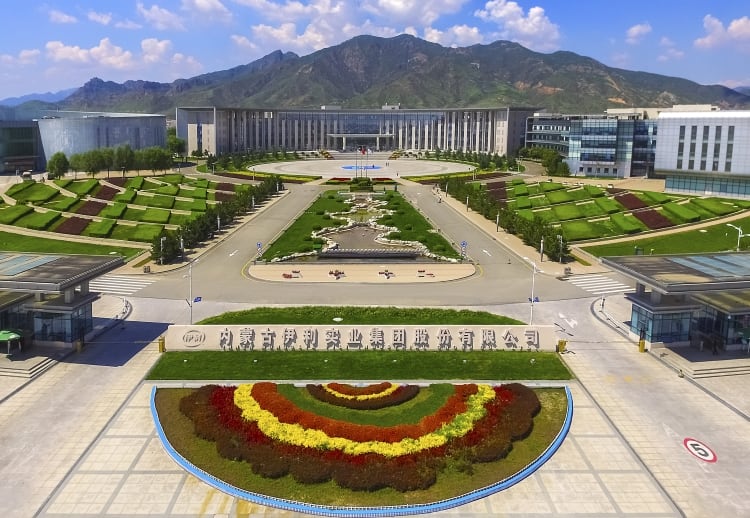On October 14, the Ecological Civilization Forum under the 15th Conference of the Parties (COP15) of the Convention on Biological Diversity (CBD) kicked off in Kunming Yunnan Province in China. As a representative of business enterprises, Yili was invited to the sub forum to explore the theme “Ecological Civilization and Biodiversity Mainstreaming.”
During the session, Yili showcased its progress under the Yili Homeland Initiative and discussed future plans on biodiversity protection along with experts from the UN Food and Agriculture Organization (FAO), the World Bank and other international organizations.
Yili Satine Milk joined the Chinese National Committee for UNESCO Man and the Biosphere Programme to launch China’s first Smart Grasslands monitoring and protection project, according to Zhao Xin, vice president of Yili Group.
Protecting the ecology requires better understanding about grasslands and acquiring more precise and detailed information about grasslands is essential, the company said. The project aims to monitor and collect data on grasslands in a more intelligent manner. The latest infrared monitoring technology and automatic camera systems will be applied to collect data to support scientists conducting related research and future conservation projects.
As a grassland-based enterprise in Inner Mongolia, Yili said it is committed to grassland protection. By promoting integrated farming on the pasture in Ar Horqin Banner, the annual output of superior alfalfa and oats there has amounted to over 40,000 tons, while 30.7km² of degraded grasslands has been enriched. It ensures both the supply of coarse fodder for cows and desertification prevention and control. The vegetation coverage of the core area has grown from less than 10% in 2008 to more than 90% today.
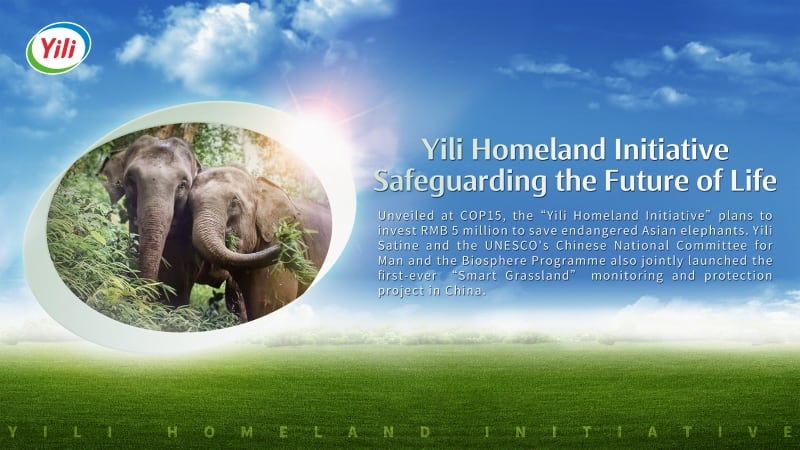
On the eve of COP15, Yili Group officially launched the Yili Homeland Initiative and unveiled the "Save the Endangered Asian Elephant” project.
Yili plans to work with the China Green Foundation over the next five years and invest at least RMB 5m ($780,000) in the causes. In addition, Yili’s Plant Selected oat milk has rolled out a newly-designed package featuring the theme of “sending elephants back home.”
Three percent of the product sales are to be dedicated to supporting the elephant-protection initiative. Under the initiative, Yili has dedicated itself to itself to biodiversity protection through multiple actions with WWF and the China Green Foundation, covering smart grasslands protection, wetland protection in Northeast China, and habitat protection for Asian elephants.
The “Save Endangered Asian Elephants” project will cover five areas: restoring habitats, rescuing wild elephants, strengthening protection methods, collaborating with communities, and educating the public about natural sciences. On top of restoring the natural habitats, Yili will also endeavor to ensure harmonious coexistence between the elephants and local communities by establishing a complete monitoring system and promoting safety awareness education.
Yili plans to invest RMB 5m to save endangered Asian elephants.
Beyond biodiversity protection, Yili said it is also pursuing green development throughout its production and operations. In 2020, 114 of its suppliers were encouraged to transition their businesses to green packaging, biodegradable, recyclable materials, and standard processing techniques.
Additionally, Yili said it adheres to green factory principles and takes into consideration environmental protection from architectural design to the selection of building materials to energy and resource optimization.
Yili said it has also embraced environmentally-friendly packaging materials. All Yili Satine Milk products are packaged with FSC-certified materials, and plant-based bottle caps made of sustainable, recyclable sugarcane are now being used in China for the first time. This will help reduce carbon footprints and help reliance on fossil fuels.
Consumers can also watch a broadcast on grassland ecology by scanning the QR code printed on the bottle.
Biodiversity
Yili told DairyReporter biodiversity is the basis for the survival of humanity and countless species, all of which benefit from safeguarding natural environments and restoring ecosystems.
“The dairy industry, which Yili has always been dedicated to supporting, is closely intertwined with both nature and biodiversity. We believe that only through mutually beneficial interactions between enterprise and nature can we achieve effective integration of short-term benefits and long-term development as well as the unity of healthy development of enterprise and the sustainable development of society,” Yili said.
The company said it began focussing on biodiversity in 2007, and has integrated biodiversity protection into its production chain.
“The company’s commitment to social responsibility has been integrated into operations at the time when every product enters its life cycle. In 2016, Yili became the first signatory to the UN’s Business and Biodiversity Pledge in China and has published its Annual Report on Biodiversity Conservation for four consecutive years since 2017, summarizing and improving its strong management experience and practices in ensuring biodiversity protection,” Yili told DR.
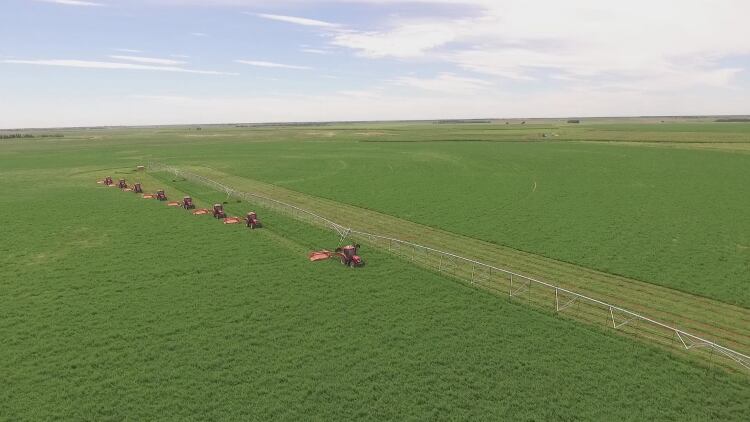
“As a grasslands-based company in Inner Mongolia, Yili Group has been dedicated to grassland protection, understanding that grassland is the basis for protecting grassland ecology. The core of Yili Homeland Initiative Smart Grasslands is “wisdom”, which is launched with the aim of monitoring data and information in a smart manner Specifically, Yili Satine Milk plans to monitor grasslands continuously though the latest infrared monitoring technology and an automatic camera system. The data and information obtained via smart methods will become an import support for scientists to study and protect grasslands.”
On the conservation of elephants, Yili said they require a high-quality living environment: at the core of elephant conservation is creating an environment where they can grow up and reproduce without being disturbed by humans.
The company said the endangered Asian elephants initiative has been built on five pillars: restoring habitats, rescuing wild elephants, improving protection methods, collaborating with communities, and public nature science popularization, further expanding the scope of conservation activities.
As well as protecting Asian elephants, Yili said the project has extended its reach to focus on ensuring the coexistence between the elephants and their surrounding communities.
DairyReporter asked how the commitment to biodiversity and sustainability is reflected in Yili's daily operations and its products.
Yili said it has built a life-cycle environmental management model, integrating green concepts into the whole process of construction, manufacturing, transportation, and consumption of pastures and factories.
“Upstream, Yili has innovatively promoted the integrated farming of alfalfa on pastures in Ar Horqin on pastures in Ar Horqin Banner, Inner Mongolia Autonomous Region. In addition to improving economic performance, 46,000 mu (approx. 7,600 acres) of degraded grasslands has been improved, and the vegetation coverage in the core grassland area has increased from less than 10% to more than 90% for more than a decade.
“Midstream, Yili has carried out its carbon footprint for 11 consecutive years in its own factories since 2010 and basically formed a carbon emission database in dairy product processing and manufacturing. With 2010 set as the benchmark, Yili has reduced 6.51m tons of CO2 equivalent, or 10.7bn KWH, over the past 11 years. By following the principle of building green factories, Yili has taken environmental protection into consideration throughout multiple stages, ranging from architectural design, purchase of building materials, energy consumption and resource utilization in operations.
“Downstream, Yili has worked unremittingly to improve the utilization and turnover rate of transport vehicles to deliver upon its commitment to empowering green lifestyles and green consumption for consumers. Additionally, Yili has advocated the application of environmentally friendly packaging materials. For instance, all Yili Satine Organic Milk products are packaged with FSC-certified materials. Plant-based bottle caps made of sustainable, recyclable sugarcane have also been introduced for the first time in China, which help to reduce carbon footprints and therefore reliance on fossil fuels. During COP15, Yili Plant Selected oat milk rolled out a newly designed package featuring the theme of “sending elephants back home”, with 3% of the product sales used as charity funds to support the Yili Homeland Initiative.”
Yili said it is also addressing land use and loss of biodiversity by promote its “integrated farming” mode.
“Yili has been promoting integrated farming across its large-scale pastures since 2013, closely combining planting and breeding. On the one hand, cow dung is used as fertilizer for corn silage fields outside the pasture to effectively absorb manures and improve soil fertility. On the other hand, following the corn harvest, the straw may serve as coarse fodder to feed the cows to meet pasture feed requirements.
“It is estimated that every ton of straw-based fodder can replace 250 kilograms of grain, and the nutrients provided by one ton of dung is equivalent to that of 20 to 30 kilograms of chemical fertilizers. Through 2020, 272 partner pastures have been included in Yili’s integrated farming system.”
Also, to reduce greenhouse gas (GHG) emissions resulting from cow farming, Yili said it has actively worked to measure emissions resulting from dairy cows in cooperative pastures, and establish the Dairy Nutrition Assessment System (DNAS), properly optimize the daily ration for cows, and feed cows with highly nutritious and easily digestible alfalfa and silage corn to help speed up their digestion and reduce methane emissions due to fodder fermentation in cows’ intestines.
“Yili considers not only food quality and security, but also ecological security when purchasing feed and dairy products. For example, Yili's palm oil purchases, whether soybeans from China or palm oil from Southeast Asia, give priority to certified sustainable raw materials.”

